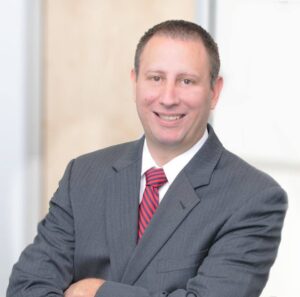Whether they planned it this way since (or even before) they granted certiorari to both Janus v. AFSCME and National Institute of Family and Life Advocates v. Becerra, or whether things just fell into place, two of the three the crowning decisions from the last week of the current term of the U.S. Supreme Court will deal with the important and still-evolving “compelled speech” doctrine under the First Amendment. And we predict these two cases will be decided in such a way as to advance this doctrine as a bulwark against state and local governments compelling certain speech from private citizens and enterprises.
The compelled speech doctrine
The compelled speech doctrine is that legislators, regulators and other government actors cannot require an individual or group to engage in certain expression. We typically think of the First Amendment as limiting the government from punishing someone because of his speech. The compelled speech doctrine also prevents those same government officials from punishing someone for refusing to advance the government’s approved messages.
In West Virginia State Board of Education v. Barnette (1943) SCOTUS advanced the compelled speech doctrine by ruling that a state cannot force a child to stand, salute the flag, and recite the Pledge of Allegiance. The Court allowed school children who are Jehovah’s Witnesses (for religious reasons) to refuse to participate in the district-required speech. From the decision:
If there is any fixed star in our constitutional constellation, it is that no official, high or petty, can prescribe what shall be orthodox in politics, nationalism, religion, or other matters of opinion or force citizens to confess by word or act their faith therein.
Just last decade, in Rumsfeld v. Forum for Academic and Institutional Rights (2006), Chief Justice John G. Roberts Jr. stated the principle more directly:
Some of this Court’s leading First Amendment precedents have established the principle that freedom of speech prohibits the government from telling people what they must say.
And this doctrine has been advanced in other cases, such as Wooley v. Maynard (1977) (state officials could not punish a man for covering the state’s motto — “Live Free or Die” — on his license plate) and Hurley v. Irish-American Gay, Lesbian and Bisexual Group of Boston (1995) (government actors violated the rights of parade organizers by requiring that they include a gay rights group and its messages).
Notably as to the Janus decision (discussed below), the court addressed this issue in Abood v. Detroit Board of Education (1977). However, because that decision did not go as far as the Janus petitioners seek, the Janus case (we predict) will overturn the Aboud precedent. In Aboud, the Court allowed states to mandate public union membership, but split the dues between collective bargaining activities (compulsion OK) and political activities (compulsion forbidden).
Roberts Court loves the First Amendment
Then, as we have expressed previously, if the Roberts Court stands for anything, it is advancing First Amendment protections, including into areas not previously sacrosanct. We expect the Janus and NIF&LA cases will continue that trend, but in these cases in the specific area of compelled speech.
Janus
The Janus decision is the third try recently to overturn the “halfway” decision in Abood. Again, in Abood, the Court ruled that the Plaintiff could be forced by the Detroit School District to pay a “fair share” or “agency” fee to the labor union for collective bargaining services, reasoning that not to do so would allow them to be a “free rider” for those services. The Janus decision directly challenges that hair-splitting, arguing that compelling union membership is indeed compelling support of all of those things the union supports, including their position in contract negotiations, with which a member may disagree.
In 2014, the high court decided Harris v. Quinn, a curve-ball case of the State of Illinois compelling payment of union “agency fees” for collective bargaining by home health care workers who were not direct employees of the state, or in the words of the court “full-fledged public employees.” The court ruled “no.” In doing so, however, it did not directly overturn Abood, but Justice Scalia invited Abood challenges by stating in his opinion that it had been incorrectly-decided.
That invited the case of Friedrichs v. California Teachers Association in the 2015-16 term, which certainly would have extinguished the Abood precedent, except that Justice Scalia — who started the firestorm — died after oral argument but before the case could be decided. The Friedrichs case, which appears to be indistinguishable from Janus, was thus decided 4-4 with the Scalia-short court, upholding the 9th District opinion that was consistent with Abood.
Thus, this coming week we expect that the compelled speech doctrine will get a substantial shot in the arm, albeit by a 5-4 vote, by the Supreme Court in its Janus decision broadly preventing government actors from negotiating union contracts that compel union membership or union dues as a condition employment.
National Institute of Family and Life Advocates v. Becerra
And that brings us to NIF&LA v. Becerra which seeks to invalidate a California law requiring pro-life counseling centers that counsel against abortion (“crisis pregnancy centers”) to to provide patients with specific kinds of information, including, for some, the availability of low-cost or free abortions.
We believe the Court will again advance the compelled speech doctrine by striking the California law.
(This will then raise the further question about pro-life state legislatures who require abortion clinics to provide certain information to patients arguably advancing an anti-abortion message.)
So, a big week is expected for the First Amendment and the Compelled Speech doctrine
Thus, it appears to me that the Supreme Court has written the theme for the last week of the Court term by joining the timing of announcing these decisions (if not the decisions themselves) for the same day or week.
Crescendoing the 2017-2018 term with these two decisions, the Roberts Court will firmly boost the compelled speech doctrine.





